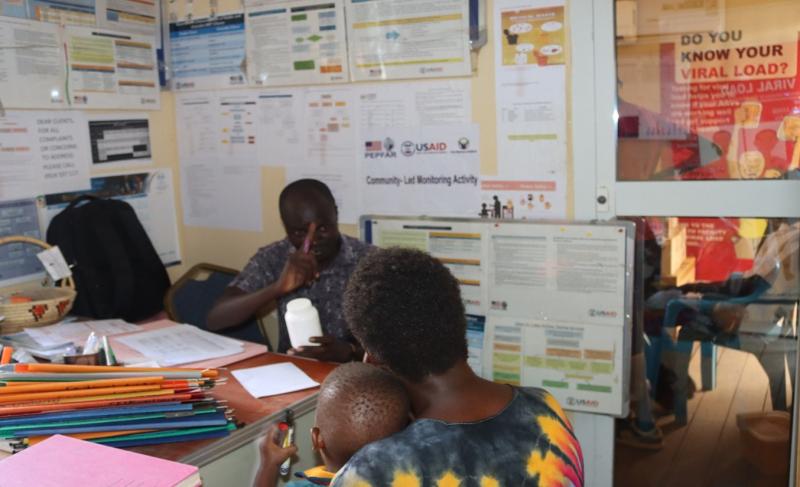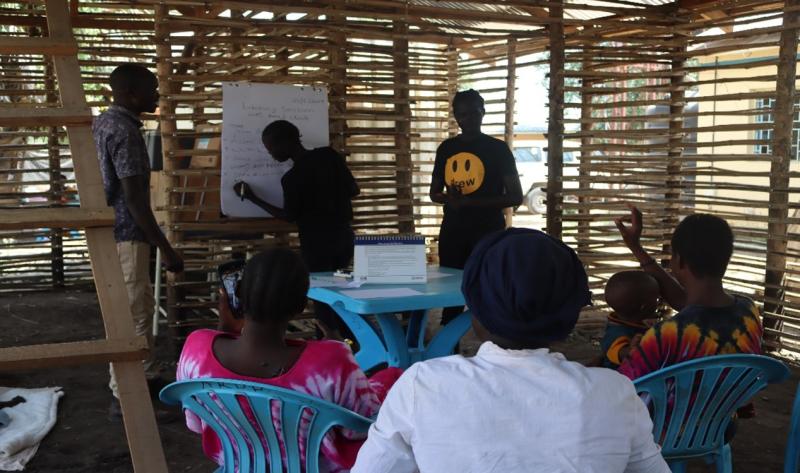Where We Work
See our interactive map


Emmanuel Taban, an ART provider at Gumbo Primary Health Care Center in Juba, uses basic signs to counsel Sharon during her refill of antiretroviral therapy (ART) medication. Photo by Gladys Achan for IntraHealth International.
Sharon explains the challenges she faces in the community.
In South Sudan, the disabled community faces overwhelming barriers—especially related to communication and stigma—to accessing HIV services and information.
In February 2022, Sharon,* who is deaf and nonverbal, felt unwell. She had lost her appetite and was losing weight. She felt extreme fatigue, muscle ache, and fever. And she was pregnant. Sharon decided to visit the antenatal care clinic at Gumbo Primary Health Care Center (PHCC), about a half kilometer from her home in Juba. There, based on the standard antenatal care service package and her current medical history, she agreed to be tested for HIV.
The provider informed Sharon that she was HIV positive and, after counseling on the benefits of treatment and need for adherence, immediately linked her to antiretroviral therapy (ART) and attached her to a mentor mother at Gumbo PHCC, as her community treatment supporter.
Gumbo PHCC is one of the facilities IntraHealth supports through the USAID Advancing HIV & AIDS Epidemic Control (AHEC) Activity. The facility currently provides HIV services to 1,506 clients, many of whom are part of key and vulnerable populations. AHEC prioritizes these populations in its work to raise awareness of HIV; promote pre-exposure prophylaxis (PrEP) and other prevention methods; and identify people who are HIV positive, enroll them in ART, and support adherence to maximize HIV viral suppression and reduce further transmission of the virus.
Disabled clients like Sharon often find it hard to get health information and communicate their needs to health providers so they can adequately respond. Most health workers do not know sign language and information, education, and communication materials are usually not available in braille for people with visual disabilities. Moreover, the stigma associated with disability coupled with stigma around HIV may cause deaf and disabled people to not access services. But this is a problem. In sub-Saharan Africa, men with disabilities are likely 1.4 times more at risk of HIV, and women with disabilities are 2.21 times more at risk of HIV, than men without disabilities. People with disabilities are also at a higher risk of sexual and other forms of abuse. Gumbo PHCC strives to provide person-centered care that meets the needs of all its community members.
Sharon spoke to me through a friend, who is also deaf and can read and write in English. As Sharon signed, her friend wrote:
I didn’t break down but accepted my status, because I knew I couldn’t change the result.
Sharon had her first baby the year before and unfortunately the baby developed a serious infection and died. Sharon thinks the baby probably died of HIV-related conditions, based on what the HIV service providers explained to her about the virus.
Months after starting ART, Sharon gave birth again at her parents’ house, and her new son is now as precious as gold to her. However, due to cultural beliefs that prohibit a newborn to be taken outside the home or to public places, she wasn’t allowed to carry her son to the health center for a newborn checkup. Sharon also declined home visits from the mentor mother attached to her because she feared her HIV status would be exposed to her family.
Sharon signed:
I have refrained from disclosing my HIV status to my husband because I fear that he will abandon me and our kid.
In February 2024, when her baby was nine months old, Sharon was finally allowed to bring her son to Gumbo PHCC, where health workers assessed him and conducted a PCR test, which came back negative. Sharon was ecstatic and promised to bring her son for the next PCR, six weeks after stopping breastfeeding. The health providers advised Sharon to wean her baby off breastfeeding at 12 months to reduce the risks of him contracting HIV, a recommendation Sharon took positively. Sharon has been taking her ART as prescribed, and both mother and baby are thriving.
One day, Sharon noticed that her neighbor’s child was very sick and had lost weight. Sharon advised her neighbor to take the child to Gumbo PHCC. Sharon accompanied them to the health facility where the child was assessed, tested HIV negative, and the ART provider linked him to a nutrition unit at the facility where he is currently receiving food supplements.
The two women later teamed up and together brought four other young deaf women from their community to access health services at Gumbo PHCC. They are all currently participating in a peer educator program organized by IntraHealth’s ART providers at Gumbo PHCC, Emmanuel Taban and Esther Kaku.
The peer educator program, called “Literacy Sessions,” is a mother-to-mother support group for pregnant and breastfeeding women, and equips them with knowledge on HIV—including about HIV testing services, treatment, and prevention methods—and other key health information. Four of the young women, ages 19-23, are currently receiving PrEP from the facility to help reduce their risk of contracting HIV.
Through the peer educator program, the women also share their experiences to reduce stigma and discrimination and provide psychosocial support.
Sharon signed:
Sometimes I feel stigmatized. People ignore me even at health facilities because I am deaf and nonverbal. The deaf education system in South Sudan is very low and I didn’t get the chance to benefit much from it, but I want that to change, and I want to contribute to it.
The Gumbo PHCC health providers have taken a huge stride in creating a convenient and friendly environment for the deaf and ensuring they leave no one behind in HIV service provision. However, despite Esther Kaku’s consistent advice to Sharon to disclose her HIV status to her husband, Sharon still declines. Esther continues to explain the importance of disclosure and hopes that Sharon will be open to her family someday.

Health workers lead a Literacy Session with deaf clients at Gumbo PHCC. Photo by Gladys Achan for IntraHealth International.
“When anyone can have access to culture and language, they are better prepared and equipped for self care, to seek health services, and demand access, which will enable HIV survivors to live longer,” says Emmanuel Taban. “As a health provider, my role is to ensure everyone can access quality health services without discrimination—deaf and nonverbal alike.”
"Mothers and children with disabilities are the most marginalized and hidden in the society due to stigma and discrimination,” says Sophia Mohammed, country director of Light for the World in Juba. She says less than 1% of deaf people in South Sudan have access to health services because of communication barriers.
Taban urges the South Sudan Ministry of Health to focus more on training and employing health care providers who can directly communicate with deaf and disabled clients and improve qualification standards for interpreters assisting with health care services. They should encourage adoption of deaf and nonverbal peer educator programs, just like Gumbo PHCC is already doing.
Meanwhile Sharon and her friends have pledged to keep bringing deaf people living in their community to Gumbo PHCC for HIV services.
Sharon signed and her friend wrote:
Both written and spoken English are huge challenges to me, but I have found comfort in the Gumbo PHCC health providers, who have created a very conducive environment for me and my deaf friends. They help translate the health-related messages to us in detail.
*Sharon is not her real name.
IntraHealth leads the USAID Advancing HIV & AIDS Epidemic Control (AHEC) Activity, building on nearly two decades of partnership in South Sudan. Since 2009, IntraHealth’s USAID-funded programs have provided 650,625 people in the country with HIV counseling and testing services, and 5,130 women with antiretroviral therapy (ART) to prevent mother-to-child HIV transmission. AHEC currently provides free ART to 14,862 people living with HIV.
Patrick Buruga, senior technical manager for AHEC, and Obalim Simon Peter, PHCC Coordination Officer contributed to this article. Carol Bales edited this article.
Get the latest updates from the blog and eNews




